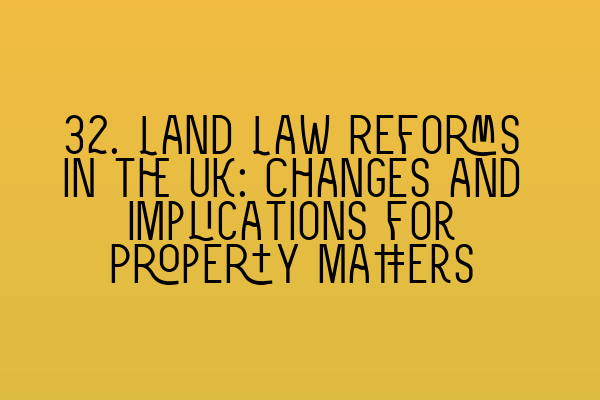Land law in the UK has recently undergone significant reforms that have wide-ranging implications for property matters. These changes are aimed at modernizing and streamlining the legal framework around land ownership, rights, and transactions. In this article, we will explore the key reforms and their implications.
One of the most significant reforms is the introduction of the new SQE (Solicitors Qualifying Exam) for property law and land law. The SQE is a standardized examination that aims to ensure all solicitors have the necessary knowledge and skills to practice in these areas. It consists of two stages: SQE1 and SQE2. To prepare for these exams, aspiring solicitors can benefit from SQE 1 practice exam questions and SQE 1 practice mocks FLK1 FLK2.
The SQE 1 exam covers a wide range of topics, including land law, property law, and equity and trusts. It is designed to assess candidates’ understanding of the legal principles and concepts in these areas. To help candidates prepare for the SQE 1 exam, SQE 1 preparation courses are available.
The reforms in land law have also led to changes in the rights and interests associated with land ownership. One notable change is the introduction of a new system of registration for land ownership. Under this system, all land must be registered in a central registry, known as the Land Register. This aims to provide a more transparent and efficient process for recording and transferring land ownership. To learn more about the land registration process, you can refer to our article on SRA SQE exam dates.
In addition to the new registration system, there have been changes to the legal principles governing land ownership. For example, the traditional concept of adverse possession, where someone can acquire ownership of land through continuous occupation, has been revised. The time period required for adverse possession claims has been extended and additional criteria must be met. These changes aim to strike a balance between protecting landowners’ rights and facilitating a fair and efficient resolution of disputes.
Furthermore, reforms in land law include changes to the rules surrounding easements and covenants. Easements are rights that one person has over another person’s land, such as the right to cross their land for access. Covenants are agreements between landowners that impose obligations on how the land can be used. These changes aim to clarify and simplify the law in these areas, making it easier for parties to understand their rights and obligations.
These reforms in land law have implications for various property matters, including buying and selling land, leasing property, and resolving disputes. For example, when buying or selling land, it is essential to ensure that the proper legal requirements are met, including registration and compliance with easements and covenants. The changes in land law also affect landlords and tenants, who must navigate the new legal landscape when drafting leases and dealing with issues such as rent reviews and repairs.
Overall, the land law reforms in the UK have introduced significant changes that have wide-ranging implications for property matters. It is crucial for solicitors and property professionals to stay updated with these reforms to ensure compliance and provide the best legal advice to their clients. To prepare for the SQE exams and stay abreast of the latest developments in land law, you can explore our SQE 2 preparation courses and SQE 1 preparation courses, which cover the key topics and provide comprehensive study materials. Investing in quality preparation is essential for success in the SQE exams and in navigating the evolving landscape of land law in the UK.
